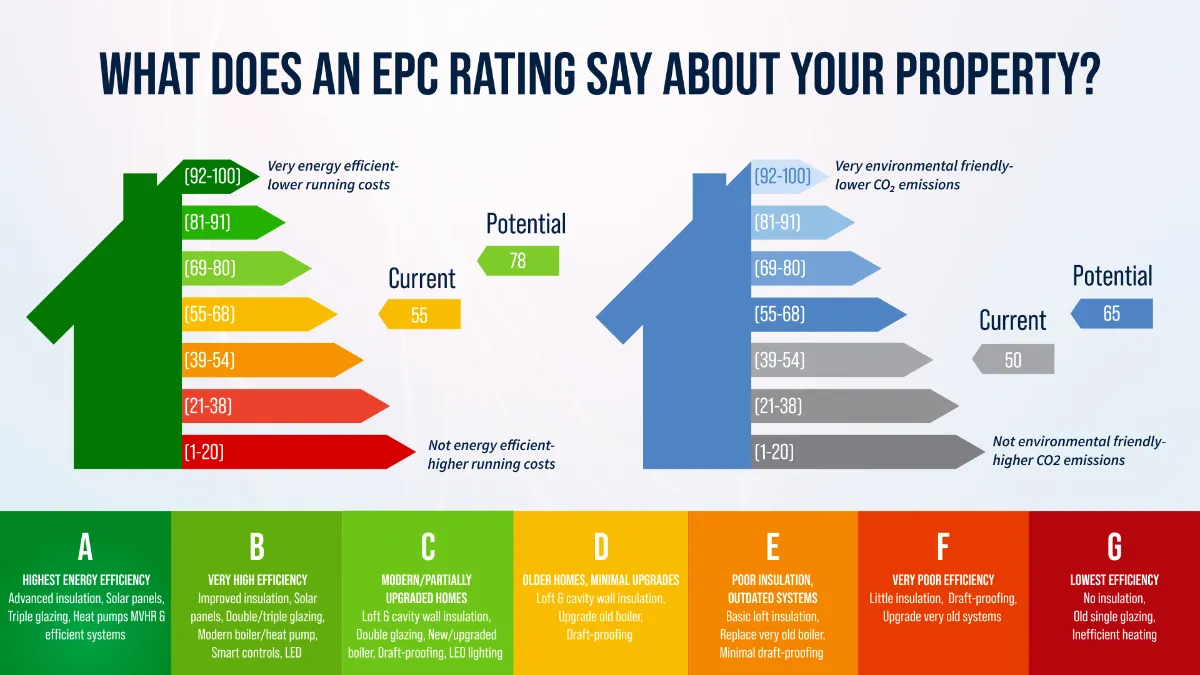EPC ratings reflect a property’s energy efficiency and suggest steps to improve efficiency for long-term savings and better consumption habits. By learning about EPC and its implications, you can not only save significantly but also improve your property’s rental appeal and increase its sales value.

Your electricity consumption has a direct impact on the monthly running cost of your property. Suppose your property is older and not renovated up to modern energy efficiency standards. In that case, the electricity bill you receive will be higher than that of other homes in your neighbourhood with a better EPC rating.
What is an EPC, and why should you be aware of it?
An Energy Performance Certificate is a document issued for every residential property in the UK, determining its energy performance by measuring emissions and fuel costs. To standardise the process, properties get a numerical and lettered grade based on their performance metrics. Properties that have a higher value from (1-100) and better grade between A (most efficient) to G (least efficient) are usually the homes that manage to keep their bills low.

How does EPC affect running costs?
While a London home has multiple running costs, such as council taxes, maintenance, home insurance, gas, broadband and other utilities, electricity is a key cost, with the average London household spending nearly £100-£120 per month. While household electricity consumption largely depends on factors such as the size and type of the property, the number of people living in it, and their consumption habits, an EPC certificate provides a blueprint for improving overall energy efficiency.
Depending on the energy efficiency features in your property, the appointed Domestic Energy Assessor (DEA) will allot points, which, when tallied together, determine the overall EPC grade of your property. Here’s a visual representation of what each grade means.
What are easy ways to boost a home’s EPC score?

Whether you are a homeowner or a landlord, there are many ways in which you can improve your property’s EPC score. Start by making the easiest and most cost-effective upgrades, while gradually working towards bigger upgrades that may require more investment, but will eventually benefit by reducing the bills. According to most DEAs, suggestions for improving a home’s EPC score include measures such as draught-proofing, insulation with double or triple glazing, and installing renewable energy appliances.
These also include installing cleaner technologies, such as solar panels, ground-source heat pumps, and mechanical ventilation with heat recovery (MVHR) systems. Improving loft insulation and replacing traditional light bulbs with modern LED lights are other easy and cost-effective ways to boost your home’s energy performance.
Why should I improve my home’s EPC?
The average annual utility bill of a G-rated property is almost six times the annual bill of a similar-sized A-rated property. The wide gap between London’s most and least energy-efficient homes has a direct impact on the electricity consumption and expenses of those living in these properties. This makes energy-efficient homes even more desirable to homeowners and tenants seeking long-term savings.
Based on a property’s EPC rating, several other frameworks come into effect, for example, as per current legislation, landlords with EPC ratings below E cannot legally rent their properties in the UK. Therefore, improving your home’s EPC rating can be beneficial if you are looking to rent or sell your property quickly.
Long-term savings and greener homes

While there is a direct impact of your property’s EPC rating on its electricity bills, adopting more energy-efficient appliances and measures contributes towards a greener future. London is currently pursuing a big goal of becoming net carbon zero by 2030, prompting developers to build homes with improved energy efficiency features.
Currently, nearly half of all properties in the UK capital have an EPC rating of C or above, making London the best-performing city in the UK. However, as the laws surrounding energy consumption become tighter, it is in the best interest of homeowners and landlords to systematically invest in and improve the EPC ratings of their properties.
Become a pro landlord with expert advice
For the past 65 years, Benham and Reeves has been helping overseas London landlords and property investors maximise their returns. We offer one-stop property services to make buying, selling, letting and managing a London property easy for overseas buyers and investors.
We also publish detailed landlord and investor guides to help you better understand the UK and London property markets and make informed decisions. Contact us to learn more about investing in London properties.
International offices


















